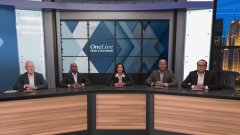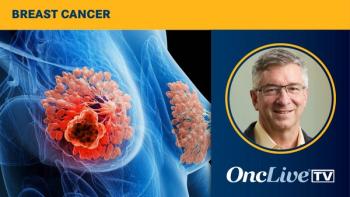
Data Updates on Sacituzumab Govitecan
Dr Gadi discusses recent data updates on the TROP-2–directed antibody-drug conjugate (ADC) sacituzumab govitecan (SG), including analyses performed in patients with HER2-low disease.
Episodes in this series

Transcript:
Komal Jhaveri, MD, FACP: Continuing that thought process about checking HER and then thinking about an ADC [antibody-drug conjugate] trastuzumab deruxtecan [T-DXd] for HER2-low [breast cancer], we also have sacituzumab govitecan [Trodelvy]. What do you think about TROP-2 [Trophoblast cell surface antigen 2] expression, and what is your idea about the TROPiCS-02 trial [NCT03901339]? Maybe you can speak to both the TROP-2 expression, whether you want to use that as a biomarker. Should we use that as a biomarker, or can we just utilize this medication and distribute the data for us?
VK Gadi, MD, PhD: I’ll just start by saying we learn more confirmation of the overall survival advantage when you use a TROP-2 ADC in ER-positive disease. It was really nice to see that hold up over time. So the drug is here to stay. Now, the question is who’s maximally going to benefit? We are very accustomed to, with a lot of biomarkers, to have cutoffs and cut points and this and that. We have something that is poorly understood by many clinicians called an H [histochemical] score for looking for receptor density related to TROP-2. It’s clear the more target is there, the more likely to see a response. And that’s regardless of ER-positive, ER-negative disease. It’s not clear, though, that we’re going to get, at least from what I can understand, that we’re going to have a biomarker-driven decision around this drug because I think a lot of us still want to use it in the TROP-2–low population, which is still quite a bit of expression with a very good drug payload associated with that drug. But there’s decisions. We know that even in this, where there’s overlap for both HER2-low and Trop expression, you have ADC after ADC sort of controversies buzzing up as well. Whether or not those payloads [are] different enough to sequence, we’re still learning those questions here.
Komal Jhaveri, MD, FACP: Yes. I completely agree. I think the TROPiCS-02 trial, at least in a very heavily pretreated patient population, was not biomarker-based I think because the idea is that TROP-2 expression is really seen in a lot of breast cancers, and we’ve seen that. As you were pointing out, regardless of Trop expression, there was some activity noted. Certainly, it seemed like the activity was a little higher with a high expressors, but given that we have majority [of] our patients, currently, the approval is not based on checking for this expression. We have the 3-month overall survival benefit that we saw. I think it was interesting to see Sara Tolaney [MD, MPH, Dana-Farber Cancer Institute, Boston, Massachusetts] present today the analysis in the TROPiCS-02 to overall survival by HER2-low status. Could you comment on that Aditya, and what were your thoughts about that analysis or how important is it to think about HER2-low for a TROP-2 ADC?
Aditya Bardia, MD, MPH: Probably not much. I think that was the point of the analysis. That this is an ADC that targets TROP-2, but people were asking a question, what’s the activity in HER2 low? The analysis was done to address that. But essentially shows that the activity is regardless of HER2, which is what we would expect.
Transcript edited for clarity.
Clinicians referring a patient to MSK can do so by visiting msk.org/refer, emailing referapatient@mskcc.org, or by calling 833-315-2722.





































